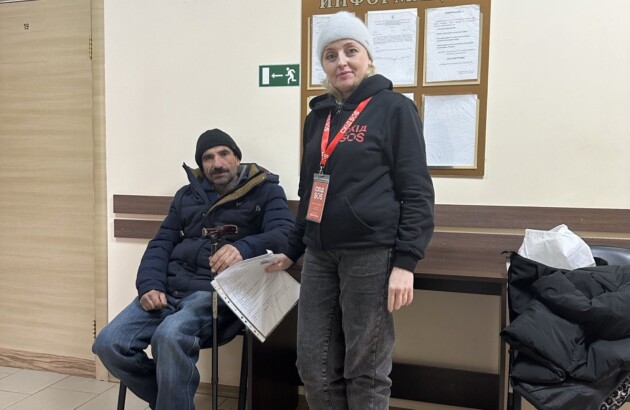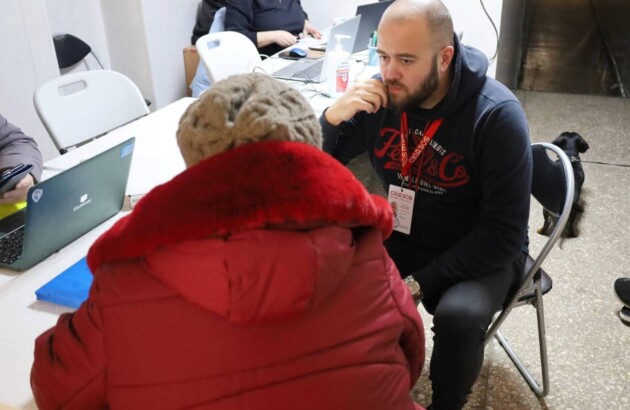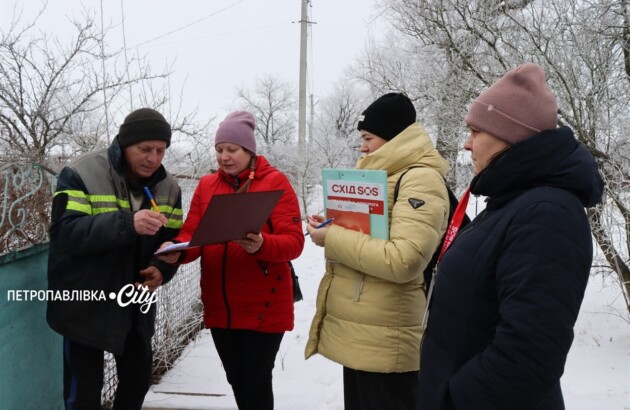Olha Dmytriiva: «I thought we would die of hunger, I can’t tell you how scared I was!»
ОльгOlha Dmytriiva (the respondent’s name has been changed for security reasons) is a 66-year-old resident of the town of Hirske, Luhansk region, and before the war in 2014, she was a kindergarten musician. Vostok SOS employees met her back in 2019 when they were documenting war crimes in the eastern part of Ukraine.
In the summer of 2016, while trying to walk from Hirske to my sister in Pervomaisk, I blew up on a tripwire. I remember how I caught my foot on something like a string right on the railway track, and I came to my senses already in the Lysychansk hospital, where I was operated on. I was unable to return to my favourite job after the injury because I partially lost hearing and the mobility of fingers. It was also very difficult psychologically – because of the sounds of explosions and shelling, I had panic attacks.
By 2022, my condition had stabilized: I stayed in my hometown, undergoing treatment in a hospital from time to time. I had everything I needed to enjoy life: my own home, relatives, friends, good neighbours, and many acquaintances because Hirske is a small town where almost everyone knows each other.
I learned about the beginning of the full-scale invasion on February 24 from the news on TV. It became extremely scary, then it became clear that this was a real war.
It was quiet in Hirske for a couple more days, but together with the neighbours, we started preparing the basement from the first day: we brought an electric kettle and a stove, chairs, old blankets, and plaids, and made sleeping places, stocked with drinking water.
On February 28, the hostilities reached us, in Hirske, and then we went down to the basement. It was very scary not only because of the explosions around: there were very few food supplies left. I thought that we would die of hunger, I can’t tell you how scared I was! I thought we wouldn’t survive.
In the basement, I was the oldest, the other people were young. I asked if they had groceries and it turned out that they were used to buying food, cooking and eating for one time, and they hardly bought much. It made me sick. People received money on the card, but the card cannot be cut and fried in a pan.
We collected the products, prepared meals from them, and then little by little we divided and distributed them among ourselves. We supported each other and tried to cheer each other up somehow.
In general, it is very difficult to live in such an extreme situation: everyone is used to conveniences, used to having light and communication, you had a talk and continued to live calmly. But there is nothing: it is dark in the basement, candles are burning, flashlights are going down, and the batteries are dead. You can’t light a bonfire – you can’t breathe anything. The basement is deep, water collects in it. Later, the neighbours said that they carried out and poured out the water with buckets because the groundwater began to rise. In general, there would be absolutely no life without a basement. No one could stand it.
And before I left, there had been an incident: 5-7 meters from my house, a bomb exploded. It beat everything very close and broke the pillar through which the electric cable passed to the garage. On the sides, the pillars were held by rails that were dug into the ground, the bomb also cut them off. I have never seen anything like this: everything is covered in sparks, there is nothing to say about the pillar, and the rails are mutilated.
Later, they started bringing in humanitarian aid and it became a little easier, but the fear of the shelling did not let go. In total, I stayed in the basement for 34 days – it was very difficult, unbearably difficult and scary, my legs could no longer walk, and I couldn’t speak. Young people dragged me to and from the basement. I cried, shook and said: “I will go. I can’t stand it anymore.”
Then I already decided that it was necessary to evacuate as soon as possible. I went home to collect things, but I couldn’t remember exactly what I needed – I was so scared that an acquaintance dictated a list of things that I needed to take with me over the phone.
On April 4, I went on the evacuation bus, which was served to the local cultural house. Many people wanted to leave that day, our bus was overcrowded, but we reached Kramatorsk without an incident.
There, we were met by volunteers. They helped us find our way, supported and took care of us. I saw how bedridden patients and infirm old women were transferred to the train – no one was forgotten. Immobile people can’t even move a finger, they just shed tears, and they are loaded, they are saved – such care, it’s something incredible! This is such a feat!
No one knew for sure the route we would take. The conductor only said that they are in contact with the military: if there is permission – we go, if not – we stand and wait.
On the way, I was still very moved by one detail: in Poltava, the conductor told us that we could go to the platform and they would feed us pies. For some reason, no one dared, but I became interested. I went and was amazed: the children treated us to pies, brought us water, some potatoes with mushrooms, my God. I gave them to everyone else, we ate these pies and washed them down with tears – everyone cried. God, we are not abandoned, someone needs us, they thought about us! Such national grief was a tragedy that affected everyone: the rich, and the poor, and it affected everyone seriously.
In the morning we reached Lviv. There, a railway volunteer helped me again to take a ticket to Uzhhorod. The next day I was already there.
As long as I live in Uzhhorod, I have no long-term plans for the future. I live for myself, I’m happy: it’s quiet here, like in paradise, calm, everyone helps. I am very grateful to the city and its residents for their hospitality and help.
The story of Olha Dmytriiva about numerous violations of the rules of warfare, recorded in articles 8 (b) (ii), (v), (xx) of the Rome Statute, namely:
“ii) intentional attacks on civilian objects, that is, objects that are not military objectives”;
“v) attacks on defenceless and non-military targets, cities, villages, dwellings or buildings or shelling them using any means”;
“xx) the use of weapons, ammunition and equipment, as well as methods of warfare of such a nature as to cause excessive damage or unnecessary suffering, or which are indiscriminate in nature in violation of the norms of international law of armed conflict.”
Although the Rome Statute has not yet been ratified by Ukraine, the absolute prohibition of attacks on the civilian population, civilian buildings, the use of indiscriminate weapons, etc. is recorded in the Geneva Conventions and the customary law of war, which is mandatory for all armies of the world. War has rules, and the indiscriminate shelling of Hirske is a brutal violation of these rules.


